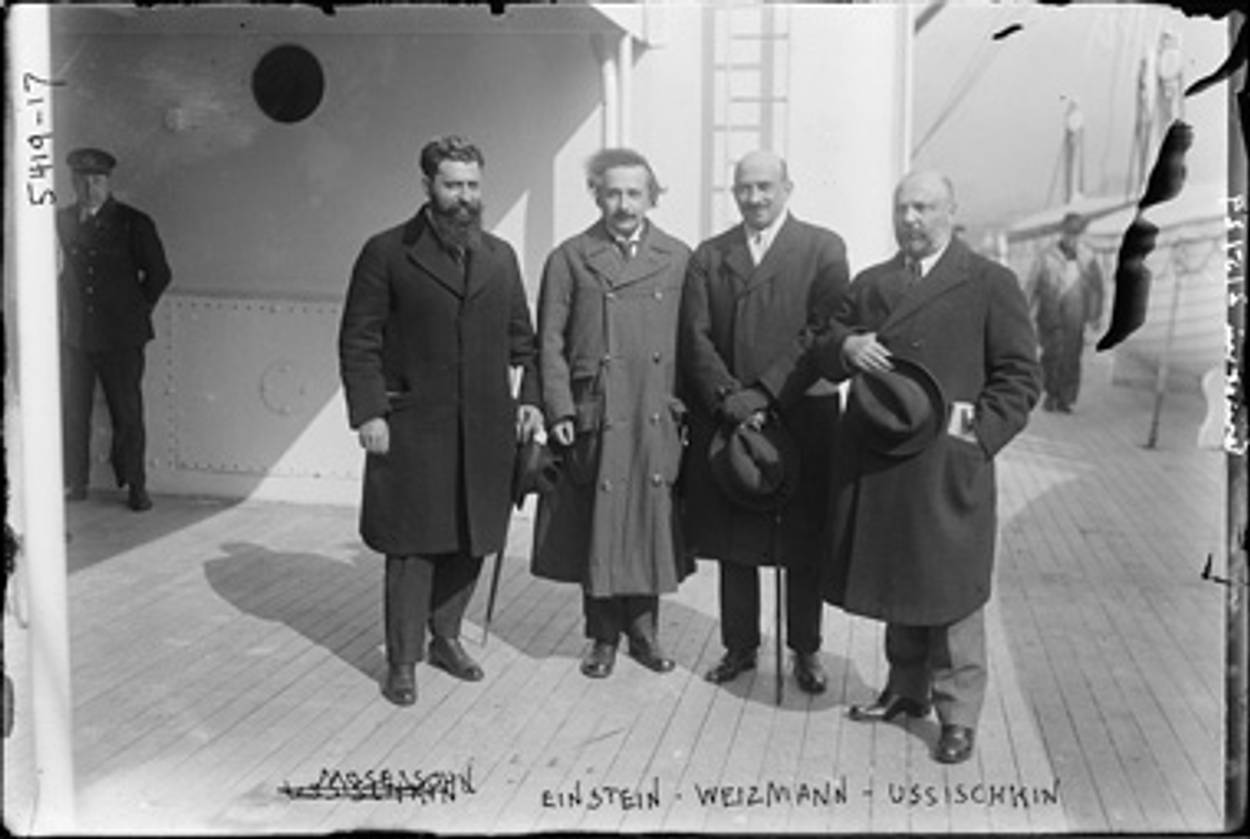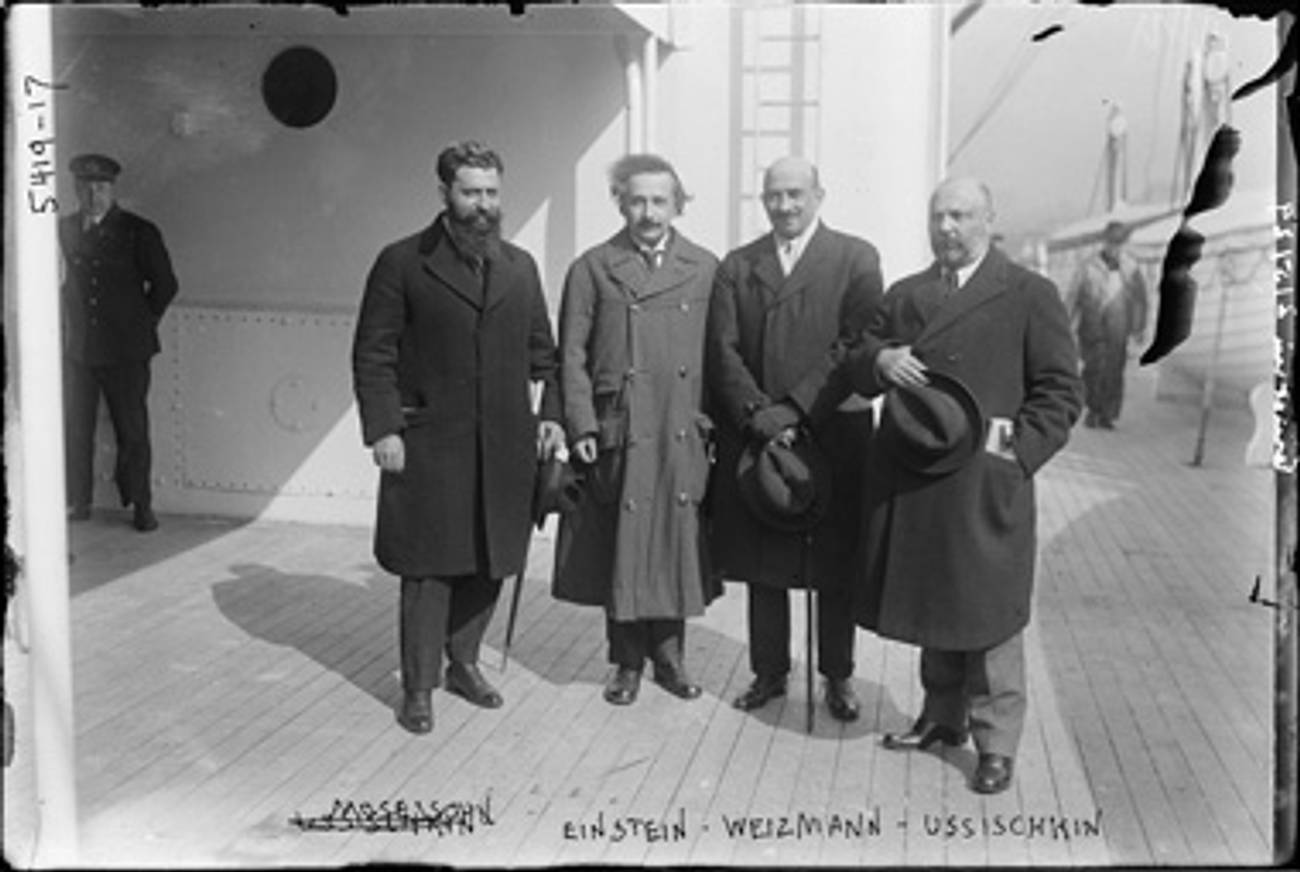Relatively Speaking, a Zionist
An anthology tries—and fails—to paint Einstein as hostile to Israel




The new anthology Einstein on Israel and Zionism is a book at war with itself. On one level, it is a straightforward historical document, collecting and translating some of the many speeches, public statements, and private letters that Einstein devoted to the subject of Zionism. That Einstein was a committed Zionist is well known. Three years before he died, Einstein wrote to Abba Eban, in a letter excerpted in this book: “My relationship with the Jewish people has become my strongest human bond, ever since I became fully aware of our precarious situation among the nations of the world.” As Fred Jerome, the volume’s editor (and the author of two previous books on Einstein), writes in the Prologue, “Those who have heard or read anything at all about Einstein’s politics probably know that Einstein was asked to become president of Israel in 1952, after the death of Chaim Weizmann, the country’s first president.”
Strangely, however, Jerome clearly intends Einstein on Israel and Zionism to be a powerful anti-Zionist statement. All the parts of the book that are not from Einstein’s own hand—the extensive passages of historical and biographical background, the introduction, the notes—are written in a spirit not just critical of Israel, but basically hostile to the very notion of a Jewish state. The book’s politics become clear as early as the dedication page, for Jerome has dedicated Einstein’s words “to the memory of Rachel Corrie,” the American teenager accidentally killed when she tried to stop an IDF bulldozer in the Gaza Strip. This is followed by a note from the book’s German translator, Michael Schiffmann, referring to the Palestinains’ “unprecedented Calvary”—a textbook example of the way durable anti-Jewish tropes are recycled into anti-Zionist ones. Jerome himself rails against “the myth of Einstein the advocate for Israel,” which he says was a deliberate creation of the American media.
How does Jerome reconcile Einstein’s obvious love for Jewish Palestine with his own antipathy to Israel? The answer is both historically simple and, as always when it comes to Israel/Palestine, psychologically complex. Starting after the First World War, when Einstein first became interested in Zionism, he was an unwavering supporter of the Yishuv, and he spent a great deal of effort making speeches and raising money for Jewish institutions in Palestine. But he was also a principled cosmopolitan and anti-nationalist, and he was chagrined by the growing antagonism between Jews and Arabs in the Middle East. In 1948, he joined a small but impressive group of Jewish notables—including Hannah Arendt, Judah Magnes, and Henrietta Szold—in arguing against the creation of a Jewish State.
Because that opposition is the sole reason why Jerome has published Einstein on Israel and Zionism in its present form, it is vital to understand the reasoning, or failure of reasoning, that led Einstein to it. First of all, like many observers in 1948, Einstein was deeply afraid that a war in Palestine might end in a Jewish defeat, which could well turn into a second Holocaust. On April 10, 1948, the month before Israel’s declaration of independence, he wrote an anguished letter to a representative of the terrorist Stern Group: “When a real and final catastrophe should befall us in Palestine the first responsible for it would be the British and the second responsible for it the Terrorist organizations built up from our own ranks.” Two days letter, Einstein and Leo Baeck wrote an open letter to The New York Times dwelling on the same fear: “We appeal to the Jews in this country and in Palestine not to permit themselves to be driven into a mood of despair or false heroism which eventually results in suicidal measures.”
Beyond the immediate danger, however, Jerome is right to remind us that Einstein was also opposed in principle to the idea of a Jewish state. In response to a questionnaire in 1947, he made his position clear: “Jewish National Home? Yes. Jewish National Palestine? No. I favor a free, bi-national Palestine at a later date after agreement with the Arabs … I am against partition.” Asked to propose his own solution to “the Palestinian problem,” Einstein wrote, “There should be a provisional UN government with a gradually increasing decentralized, bi-national self-government.”
The reasons why Einstein was so averse to the idea of Jewish sovereignty lay deep in his understanding of his own Jewishness. Einstein’s concern with Jewish settlement in Palestine started after World War I, when he was confronted with the upsurge anti-Semitism after Germans started to blame the Jews for their defeat. He admits that before the war, when he was living in Switzerland and doing the scientific work that made him famous, he had no interest at all in Judaism or Jewish issues: “When I came to Germany [in 1914] I discovered for the first time that I was a Jew, and I owe this discovery more to Gentiles than Jews.” Significantly, one of the first documents in this book is Einstein’s 1919 letter to the Berliner Tageblatt complaining about Germany’s mistreatment of Eastern European Jewish immigrants.
Like many German Jewish intellectuals of the time, Einstein found in Zionism a source of new Jewish confidence and solidarity. Broadly speaking, he can be classed with the cultural Zionists, who saw the Yishuv as a means of regenerating worldwide Jewish identity, rather than with the political Zionists, whose goal was a Jewish state. “For me,” he wrote in 1927, “the importance of all this Zionist work lies in precisely the effect that it will have on those Jews who will not themselves live in Palestine…. The internal effect, in my opinion, will be a healthier Jewry: that is to say, the Jews will acquire that happiness in feeling themselves at ease, that sense of being self-sufficient, which a common ideal cannot fail to evoke…. I believe that the existence of a Jewish cultural center will strengthen the moral and political position of the Jews all over the world, by virtue of the very fact that there will be in existence a kind of embodiment of the interests of the whole Jewish people.”
The case for Israel has seldom been better put; it would not be hard to imagine a different editor using Jerome’s own texts to put together a pro-Israel anthology. Yet Einstein was also, again like most German Jewish intellectuals, early and deeply committed to the idea of universalism, which had long been the German Jewish response to anti-Semitism. In particular, he valued Judaism, about which he actually knew rather little, solely as an expression of liberal democratic values. In a piece published in Collier’s in 1938, he declared, “The bond that has united the Jews for thousands of years and that unites them today is, above all, the democratic ideal of social justice, coupled with the ideal of mutual aid and tolerance among all men.” As history this is beyond dubious, but even today it is not uncommon to hear it from Jews who want to reconcile their particular identity with universal values.
In the post-Holocaust period, then, Einstein faced an irreconcilable conflict between two things he cherished: the flourishing of the Jews and the ideal of Jewish purity, which meant Jewish powerlessness. (“We are a minority everywhere and have no violent means of defense at our disposal to protect our community against our numerous enemies and opponents—fortunately,” he said. Fortunately—and that was in 1938, ten days before Kristallnacht.) Jerome honors Einstein for refusing to sacrifice the latter value to the former: “in today’s world,” he writes in one of his tendentious commentaries, Einstein’s view “hardly sounds like Zionism.”
But the two most interesting documents in Einstein on Israel and Zionism actually demonstrate how unsustainable and, ironic though it sounds, illogical Einstein’s position actually was. The first is a transcript of Einstein’s testimony before the Anglo-American Committee of Inquiry on Palestine, in 1946. Here Einstein rather feebly suggests that there is no genuine antagonism between Jew and Arab in Palestine, that the real source of discord is only British imperial policy. “National troublemaking is a British enterprise,” he says, and it follows that if the British were to give up their Mandate, the trouble would go away.
As a result, he is totally unable to face the truth, which is that Arab and Jewish visions for Palestine were incompatible. Einstein insists, for example, that the Jews then languishing in European DP camps be allowed to enter Palestine, contrary to British policy. One British expert asks Einstein, “What would you do if the Arabs refused to consent to bringing these refugees to Palestine?”—as, of course, they did, just as they had violently resisted Jewish immigration since the 1920s. “That would never be the case if there were no politics,” Einstein replies. There is Einstein’s fallacy in a sentence: his response to a desperate political problem is to wish that there were no politics, which is to say, no conflicting desires, no clash of rights, no power.
But surely the lesson of Jewish history is that powerlessness is not a solution for the Jews, but the most dangerous problem. The same conclusion can be drawn from another valuable document in this book, an account of Einstein’s 1952 meeting with an Egyptian journalist, Mohamed Heikal. Jerome interviewed Heikal in 2006, and he remembered his long-ago visit to Princeton to see Einstein. There the great man spoke with anguished sincerity about his desire to make peace between Jews and Arabs, and tried to use to Heikal to open up back-channel talks with Gamal Abdel Nasser, Egypt’s new ruler. Clearly hoping to find common ground with Heikal, Einstein said that “when it comes to people like Menachem Begin and his massacre of Arabs in the village of Deir Yassin … these people are Nazis in their thoughts and their deeds.”
And what was Heikal’s response? “Ben-Gurion is no less a Nazi than Menachem Begin.” Here we see the ugly reality behind Einstein’s dream of a binational state, and Jerome’s present-day anti-Zionism. There was, in 1948, no way to ensure the survival of Jewish Palestine without a Jewish state, which meant an army, a flag, borders, and all the insignia of sovereignty that Einstein detested. Likewise, there is no way to establish a true peace in Palestine today as long as so many Palestinians, elite and ordinary, are committed to Israel’s destruction. Still, Einstein has one advantage over his new editor: his reservations about Israel were voiced from the standpoint of his unquestionable commitment to Zionism. For that reason, he makes a less useful ally than Fred Jerome appears to think.
Adam Kirsch is a contributing editor to Tablet Magazine and the author of Benjamin Disraeli, a biography in the Nextbook Press Jewish Encounters book series.
Adam Kirsch is a poet and literary critic, whose books include The People and the Books: 18 Classics of Jewish Literature.
Adam Kirsch is a poet and literary critic, whose books include The People and the Books: 18 Classics of Jewish Literature.